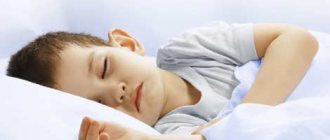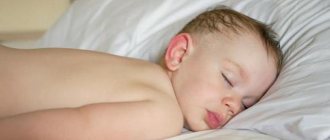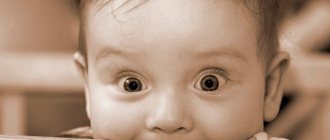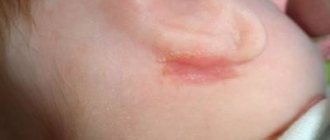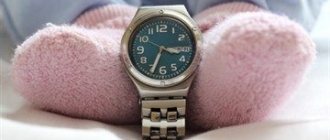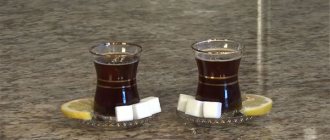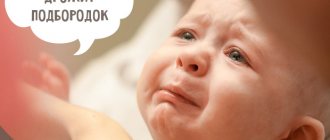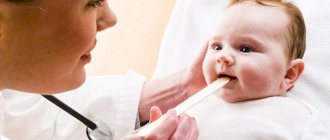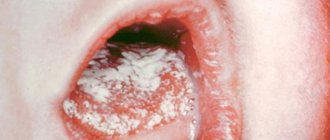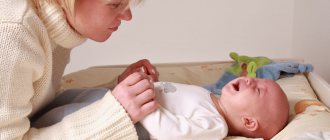On the pillow where a newborn baby sleeps, damp spots may remain after the night. Their reason is the increased work of the baby’s sweat glands. Parents may be concerned that the baby's head sweats during sleep. Sometimes sweat appears on the back of the baby's head and temples during breastfeeding. This is a common occurrence and can be both harmless and dangerous. Let's consider the main factors of increased secretion, their prevention and those cases when you should consult a doctor as soon as possible.
Most common reasons
Don’t immediately panic when you notice sweat stains on your baby’s pillow. Perhaps this is not a sign of illness, but the reasons lie in external factors, most of which are easy to eliminate. The main ones are listed below:
- Clothing made from synthetic or low-quality materials. It does not allow air to pass through well, so the child's body sweats while he moves and plays. Increased secretion is fraught with allergic reactions and the occurrence of prickly heat. It is worth choosing clothes more carefully, paying attention to natural materials - linen, cotton with a small amount of elastane, so that things stretch and do not tear quickly.
- Fatigue. Its signs are causeless crying, whims, yawning. It can increase sweating and cause problems with regulating the baby's temperature.
- Mistakes in baby skin care. Extremes are dangerous - rare or frequent bathing, refusal of cosmetics, or the use of several lotions and creams at once.
- Feather pillows and wool blankets. These are not the best materials for a baby’s bedroom, especially in the warm season - they give a “greenhouse effect”. The baby gets hot and sweats.
- Overheating. Overprotective parents try to wrap up the child “so that it doesn’t get drafty,” even if the temperature in the room has exceeded twenty degrees. Because of this, the sweat glands are activated and secrete a lot of secretions. A clear sign that the baby is hot is that he fidgets, is capricious, his face turns red, and his arms and legs become hot. Parents should ensure that the temperature and clothing are appropriate - overheating increases the risk of death.
- Physical exercise. Increased activity provokes increased work of the sweat glands. Even breastfeeding can be a burden for a baby - he puts in more effort than when drinking milk from a bottle.
- Pills. Some medications can cause profuse sweating. In these cases, the sweat smells a little like medicine. Dosages and age restrictions should not be ignored - even incorrectly taken vitamins increase secretion.
- Excess weight. Overweight children sweat more profusely than children of normal weight. Any physical activity is more difficult for them, and secretion may be disrupted.
- Heredity. If relatives have had problems with excessive sweating, it can be passed on to their children.
- Changes in hormonal levels. After birth, the baby is not adapted to new, aggressive conditions for some time. The body needs time to get used to it, to establish the functioning of all systems, including thermoregulation.
A healthy baby's head sweats mainly due to the fact that secretion has not yet been regulated, and this is quite normal. If the cause is not illness, then the sweat should not have a strong unpleasant odor. When it appears, you need to consult a doctor.
If the baby's head constantly sweats during sleep
One of the unpleasant moments in the life of a newborn child that causes concern for parents is sweating. Most often it occurs while the baby is sleeping, and mainly the head gets wet. Many people believe that if a baby's head sweats a lot during sleep, it means he is sick. It is not always so.
This phenomenon is not uncommon. How much a baby sweats is affected by his weight and build, mobility and activity. There are many reasons why a newborn sweats in his sleep, and not all of them indicate illness. But first things first.
Common Causes
Sweating in babies begins at about 3-4 weeks of life. Before this, his sweat glands are not yet developed.
There are several reasons why a child may sweat:
- the baby's bedding or clothes are made of synthetic materials;
- high humidity, too hot;
- the child is overly bundled up or dressed warmly;
- as a result of high activity;
- severe overexcitation;
- progressive disease.
If you notice that the back of your baby's head or back is sweating, don't worry. First of all, you need to make sure that the baby's room has the correct temperature and humidity conditions. Sweating in itself is not a sign of illness.
Features of thermoregulation
Child sweating is a fairly common reason for caring parents to consult a doctor. Often, sweating is no cause for concern. A qualified specialist first of all explains to the mother the features of thermoregulation of the child’s body.
As mentioned above, a baby's sweat glands are formed around the first month of his life, developing over several years. Their work will finally be established when the child turns 4 years old.
Attention! Thermoregulation of a child in infancy occurs not only through the skin, but also through the lungs. The baby's head and back will sweat if the air in the room is too dry or if there are respiratory diseases.
Overwork
Active children sweat more than quiet and calm ones. To prevent excessive sweating, you need to ensure that the child calms down. Turn off the computer or TV with new bright cartoons or songs that will unnecessarily excite your baby before bed. It is also worth giving up outdoor games - instead, it is better to read a book to the baby. This will help calm your baby and ensure he has a sound day or night sleep.
Parents may notice that the baby sweats a lot during sleep, as well as during feeding. This is due to the fact that obtaining food from the baby requires considerable effort. At this time, the temperature rises, the back of the head sweats. This is a natural process, this is how the baby’s body protects itself from overheating.
Strong crying
Little children have millions of reasons to cry. These are whims, and fear, and another “wava” that the child will forget about in a matter of minutes. Choking with tears, the baby sweats, the head and back of the head get wet. There is no need to be afraid of this: sweating in this case is natural.
The baby's sweating stops as soon as he calms down. Sometimes it’s enough just to pick him up.
Parents' mistakes
Sometimes a baby sweats during sleep due to the fault of mom and dad (or grandparents).
A common reason for this is the synthetic materials from which children's clothes are made. It is important to make sure your baby sleeps soundly. A sleeping child prefers to lie on his back; he does not need a pillow or feather bed. Also, you shouldn’t wrap him up too much: for the first year, the baby can sleep in only pajamas, at most under a light blanket.
Advice! You should remember to comply with temperature conditions. Viruses tend to develop in dry, warm environments. It is worth maintaining an optimal atmosphere in the child’s room: about 22-23 degrees Celsius with a humidity level of approximately 60%. For an adult, such conditions create discomfort, but the baby easily tolerates them - his body copes with the cold more easily.
It is important to remember that during a walk, a one-year-old baby will be in a stroller, protected from the sun, wind, and cold. It is easier for a child to endure the heat in summer in models with special valves - such “transport” prevents not only sweating, but also the likelihood of heat stroke, which can be fatal for a baby.
When choosing children's clothing for home and walking, the best option is products made from natural materials: calico, linen, flannel or satin are ideal. With them, the baby's skin will be able to breathe. Synthetics, on the contrary, float too much, which is why the baby will feel constant discomfort.
Like an adult, a child also experiences emotions. Experiences - both positive and negative - can cause the baby to sweat. There's nothing wrong with that.
Sweating as a symptom of pathology
If a child wakes up sweaty, and the sweat itself has a persistent unpleasant odor, one may suspect the presence of an illness. There are several diseases, one of the symptoms of which is sweating.
- Rickets - most often, excessive sweating is associated with it. In addition to the head, back and neck, the child’s feet and palms sweat, bald patches appear, over time there is a change in the shape of the skull, deformation of the spine, limbs, bones become soft. The disease is caused by a lack of vitamin D.
- Nervous system disorders. The sweating of any person is inextricably linked with it. When a child is naughty, he may sweat, this is normal. Very sticky sweat with an unpleasant odor indicates a nervous disorder.
- Problems with the cardiovascular system. Sweating in this case is caused by heart failure. The disease is accompanied by cold sweat and severe shortness of breath.
- Genetic feature. If the baby has relatives in his family who sweat profusely for no reason, it is likely that this quality has been passed on to him.
- ARVI. Sweating occurs as a reaction of the body to an illness, such as a cold. The body temperature rises, the baby begins to sweat. The condition is accompanied by a cough and runny nose.
It is important to know! Sweating in itself is not a sign of illness. If the baby does get sick, other symptoms will certainly be present. If you find problems with sweating, you should contact your pediatrician. Under no circumstances should you resort to self-medication, as this may worsen the condition.
Other warning signs that accompany sweating of the head
Sweating in itself is not a sign of illness. To determine whether the baby is sick or not, you need to take into account the presence of other factors.
Sticky, foul-smelling sweat is a disease. There is also poor restless sleep, crying, moaning, breathing problems, and cold symptoms. The baby wakes up with a reddened face and shortness of breath. Cold sweat, for example, can be a sign of heart problems.
Only a qualified pediatrician can establish the exact cause of sweating, as well as confirm or deny its connection with the disease. Do not take any treatment measures without consulting him.
Elimination of external causes and prevention of sweating
Some factors are easy to eliminate. To prevent excessive sweating, it is enough to follow these measures:
- Monitor the temperature and humidity level in the child's room. The best temperature is about 20-22 degrees, and humidity is no more than 70%. If the air is very hot and dry, the baby may become hot and sweat.
- Choose natural bedding and clothing. It is advisable that there are no bright patterns on the fabric. Mom should also wear cotton or linen clothes when she is going to feed her baby.
- It is recommended to change bedding as it gets dirty. You need to wash clothes and children's clothes separately from adults' clothes, choosing the appropriate washing powder. Pay attention to hypoallergenic options that are safe for delicate baby skin. Linen should be ironed well - heat treatment kills parasites that live in the fabric and are dangerous to the health of the baby.
- Do not overwrap your baby. Warmer doesn't always mean better. There is no need to wear a hat when the room is warm enough. Overheating will only make things worse for your child.
- Watch your diet. If the baby was born and weighed more than four kilograms, there is a possibility of a rapid increase in body weight in the future. In such situations, it is worth introducing complementary foods later and consulting with a doctor who will help prescribe the right diet. Excess weight is the cause of many diseases, including diabetes, so you should not feed your child.
- See your doctor regularly. The pediatrician monitors your health, suggests what tests need to be done, and recognizes possible diseases. If the cause of profuse sweating is a disease, there is a chance to cure it in the early stages. When secretion has increased due to factors that are not dangerous to the life and health of the baby, you can normalize it by adding decoctions of oak bark, chamomile or string to the bath. The doctor will also tell you what frequency and dosage to do this with.
USEFUL INFORMATION: The baby shudders in its sleep: why does this happen?
When to see a doctor urgently
Increased sweating in some cases is an “alarm bell” for parents. A child may have a sweaty head due to diseases:
- Infections that a baby contracts in the womb or during childbirth. Their causative agents are bacteria, parasites and viruses. Sweating of the head, especially in the forehead and back of the head, is a possible sign of chlamydia, mycoplasmosis, congenital toxoplasmosis and other infections.
- Acquired infectious diseases. These include colds, the symptoms of which are cough, runny nose, and fever. The baby loses his appetite, he becomes lethargic, capricious, and his body does not digest food well. At the same time, the child often sweats, and wet spots remain on the pillow.
- Diseases of the endocrine glands (thyroid, pancreas). At night, the baby produces cold sweat, weak and restless sleep.
- Problems with the liver and kidneys.
- Heart diseases. Their signs are easy to recognize - passivity, anxiety of the baby, pallor and blueness in the area of the lips and nose, profuse release of cold sweat during meals and at night. The hands, feet and head sweat the most.
- Malfunctions of the central nervous system. The baby is irritable, easily excited and cries frequently. At night my head sweats a lot.
Consultation with a doctor is necessary if, even in a calm state, the child’s head becomes covered with sticky cold sweat, from which an unpleasant odor emanates. Increased anxiety, lethargy, apathy, and lack of appetite are a good reason to get tested for diagnosis and timely treatment.
Cardiovascular problems
Diagnosing problems with the cardiovascular system in children under one year of age is quite difficult, so parents should be more attentive to their babies and mention all suspicious signs to the pediatrician. In addition to the fact that the baby’s head is sweating, the following symptoms are noted with heart failure syndrome:
- when you press on the sternum area, the baby cries in pain;
- the baby cries in his sleep, but he does not wake up, his skin turns pale and becomes covered with cold, profuse sweat;
- the nasolabial triangle turns blue;
- lethargy, lethargy of the baby, lack of appetite;
- frequent and uneven breathing;
- At the slightest physical exertion, episodes of shortness of breath are observed.
Acquired heart failure syndrome occurs in children after illnesses such as vitamin deficiency, intestinal infections, severe forms of influenza and pneumonia, nephritis and anemia. Congenital pathologies are diagnosed in the maternity hospital.
With timely treatment in children, this syndrome can be successfully cured.
Why is vitamin D deficiency dangerous?
Another reason for increased sweating is a lack of vitamin D in the body. Because of this, some children develop rickets. The exchange of calcium and phosphorus in the body is disrupted, and disruptions occur in the formation of the skeletal system. To prevent the development of the disease, you should monitor your baby and consult a doctor at the first alarming symptoms.
USEFUL INFORMATION: Why does a child's head sweat while sleeping?
The following signs indicate that the body may lack vitamin D:
- restlessness during sleep - the baby constantly cries and tosses and turns;
- panic from sharp, loud sounds, general increased irritability;
- sour smell in urine;
- sweating of the palms, feet, head during eating and sleeping, the sweat is usually cold.
The initial stage of rickets can also be tracked. It is characterized by:
- frequent sleep disturbances;
- decreased appetite;
- the appearance of bald patches in the occipital region;
- increased sweating.
If alarming symptoms are not noticed in time, irreversible changes will occur in the child’s body - improper bone formation, curvature of the spine and legs, flat feet and others. There is a danger of delayed development of psychomotor skills and disruptions in the functioning of internal organs.
Vitamin D deficiency
Rickets, which is caused by a lack of vitamin D in the infant body, is characterized by profuse sweating. The baby's head and body will become wet during feeding and sleep. With this disease, the periphery (feet and palms) will constantly sweat.
The risk of vitamin D deficiency occurs in children from two to three months, but the risk of rickets remains even in a one-year-old child if his diet does not contain enough important elements.
If your baby sweats when he eats or during sleep, as soon as he falls asleep, then the first thing you need to do is rule out the most dangerous cause - rickets. Delay in treating this disease can lead to dire consequences, ranging from developmental delays to bone deformation. To diagnose this disease, take a closer look at your baby and, if you notice these signs, immediately run to the pediatrician:
- when he eats milk or formula, or in the first hour of sleep, the baby sweats profusely;
- the back of his head began to go bald;
- the stomach expands to the sides when lying down;
- his behavior became extremely capricious.
The doctor will examine the child, ask you about the method of feeding and how he eats, and prescribe the dosage of vitamin D solution necessary for the baby. After a course of the drug, the child will stop sweating and will become cheerful and active.

